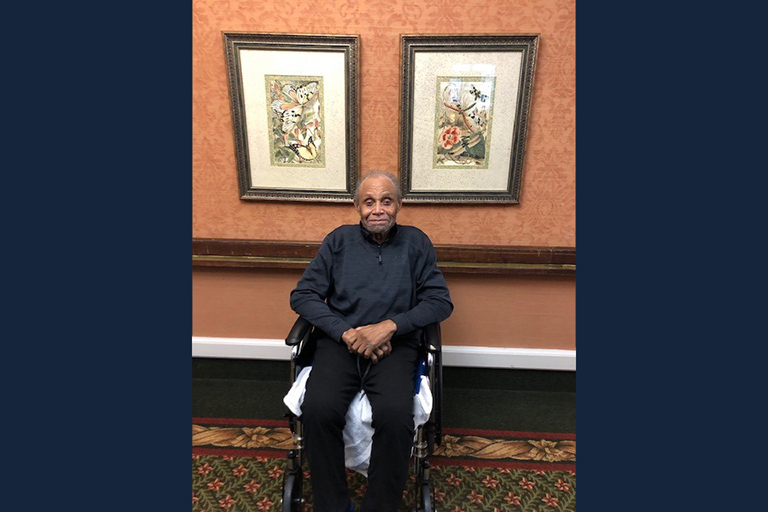
Command Sergeant Major at Life Care of Columbia shares career highlights
Life Care Center of Columbia, South Carolina, was recently honored to provide rehabilitation services for James W. Alford, a retired command sergeant major in the U.S. Army.
James, affectionately known as “Boo,” has quite the story, rising from difficulties to one of the most trusted officers in the Army.
Born in Dillon County, South Carolina, James came from a multicultural background of Black, white and Jewish. His mother, as he recounts the family story, looked at her son with darker skin, blue eyes and freckles, and said, “I made a boo-boo.” Thus, his nickname.
James was raised by his grandmother, Victoria Bethea Roper Alford. The Ropers are a big family in South Carolina, and “Ms. Vic” was very well known and respected in the community. One time, when James was young, members of the Ku Klux Klan came up to their house dressed in their white sheets. His grandmother called two of them out by name, saying, “You’d better take that off. We’ve got to pick cotton tomorrow.”
Ms. Vic died when James was 14, and he lived with his mother and stepfather, but not for long.
“My stepdad didn’t like me,” James said. “He burned my clothes.”
James left and went to find his biological father. He remembers being 14 and homeless in Richmond, Virginia, and working his way to Washington, D.C.
At 17, James joined the Army, and over the next several decades, he worked his way up the military ladder.
When he started, James said, “I kept my head down and saluted everybody.”
James was sent to fight in the Korean War. He remembers stopping in the South China Sea for all the men to receive a course in military strategy. James learned all he could, not only about warfare, but also about Asian culture and history. By the end of his time in Korea, he had learned Korean and Mandarin Chinese.
All through his life, James has had a thirst for knowledge, and his curiosity and sharp mind have made him an asset wherever he has been.
“I memorized the dictionary and bluffed my way into community college,” James said. “I did a two-year degree in six months.”
James served at Fort Pickett in Virginia and took medical courses at Fort Sam Houston, Texas. Whenever he was asked to do something or go somewhere, he determined to do it.
“I worked every job they gave me,” James said. “I was the go-to guy.”
With his knowledge about Asian affairs, guerrilla warfare and studies in languages and influencers such as Mao Tse-tung, James was asked to go to Vietnam once America entered the war there. At age 29, James began the first of four tours in Vietnam by jumping into a leper colony. He served in the central highlands among the mountain people. He helped set up a hospital and put his medical training to work delivering babies and doing dental work, when he wasn’t needed in the actual fighting.
James came back to the United States for more training in Army Intelligence School at Fort Bragg, before he went back for his second time to Vietnam with a promotion. He became part of the Green Berets Special Forces Group.
“I got a promotion about every 10 months,” James said of that time in Vietnam. He is very proud of being the first African American first class sergeant major.
Around this time, James fell in love, got married and had a daughter, Tamara. And although the marriage did not last, his relationship with Tamara remains strong to this day.
After the Vietnam War, James was assigned to patrolling the border in the Fulda Gap in Germany, a strategic military location between East and West Germany during the Cold War.
“That was a hard assignment,” James said.
After that job, James decided to come home to the United States, discharging from the military as a command sergeant major after 30 years and three months of service. During all that time, he is thankful he was never injured.
“This country’s been good to me,” James said. “I made sure I had good quality people around me, and I made sure those people got an opportunity for education before I got out of the military.”
James earned a National Defense Service medal, a Korean Service medal with four bronze stars and a Meritorious Service medal.
James did some bank work for a while, then became a security supervisor at a hospital, eventually becoming the first African-America president of the Certified Protection Professional Association. He also worked for the Pinkerton National Detective Agency.
Even after retirement, James has stayed active, even running track until he was 77.
“When you get older, you can’t just sit down and say, ‘Poor me, poor me,’” he said.
For younger generations, James offers this advice: “You can’t just sit down and hope that something’s going to come to you. You have to have a goal. If a seventh-grade dropout can do this, you can do doggone anything.”

